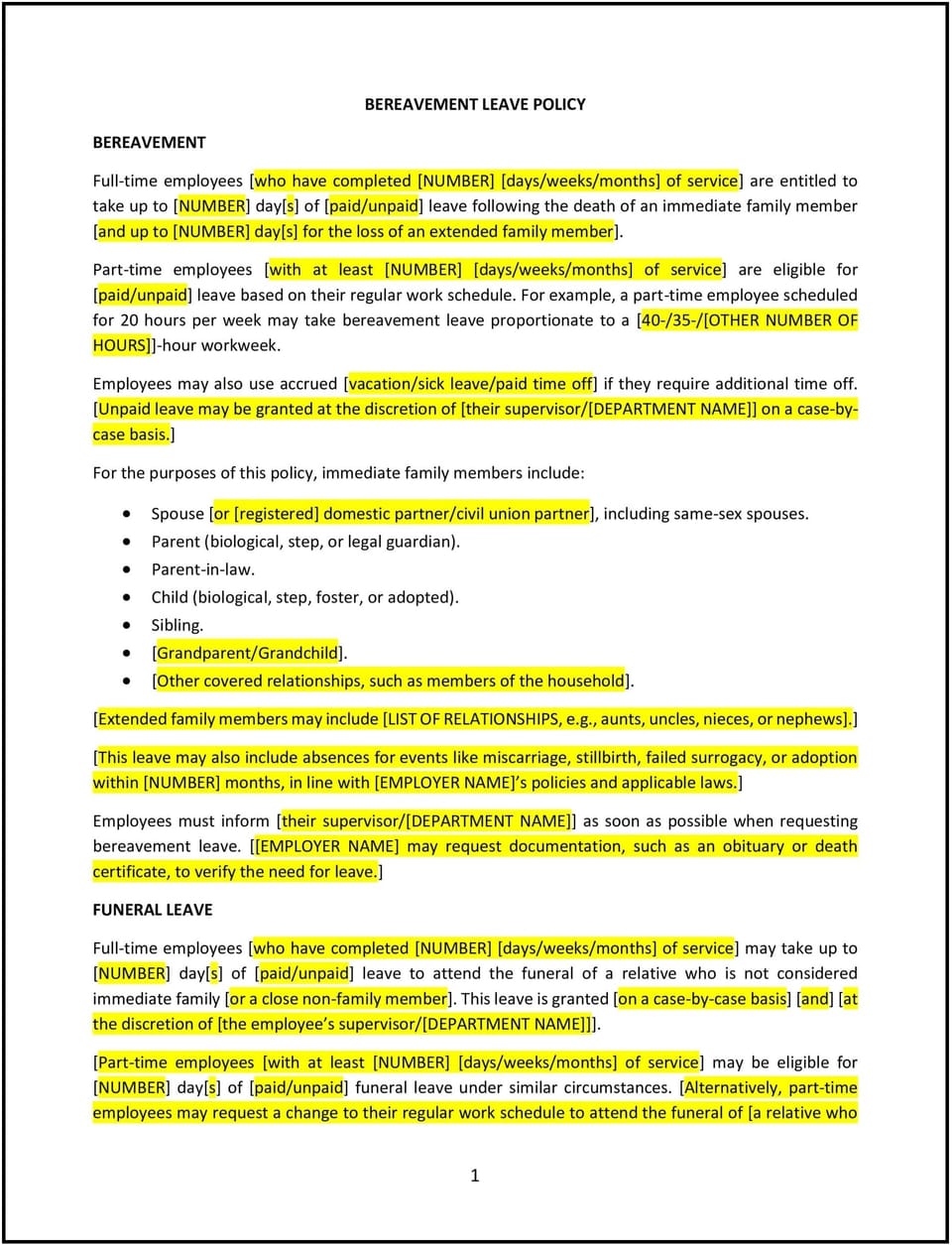Bereavement leave policy (Alaska): Free template

Bereavement leave policy (Alaska)
In Alaska, a bereavement leave policy provides employees with time off to grieve and manage personal matters following the loss of a loved one. This policy outlines the company’s commitment to supporting employees during difficult times while maintaining clarity on leave eligibility, duration, and procedures. By implementing a bereavement leave policy, businesses can foster a compassionate work environment that balances employee needs with organizational requirements.
Given Alaska’s unique geography and workforce dynamics, such as remote living and limited transportation options, this policy may also address logistical challenges employees face during bereavement. Tailoring the policy to accommodate these circumstances helps businesses provide meaningful support to their teams.
How to use this bereavement leave policy (Alaska)
- Define eligibility: Clearly state which relationships qualify for bereavement leave (e.g., immediate family members, extended family, or close relations) to set clear expectations.
- Specify leave duration: Provide guidelines on the amount of leave available, such as three to five days, and whether additional time can be requested for special circumstances, such as travel for funerals in remote locations.
- Outline the application process: Include procedures for requesting bereavement leave, such as notifying a supervisor or HR representative, and specify any documentation required.
- Address remote work considerations: If applicable, provide options for employees to work remotely or adjust schedules in the event of extended leave needs due to logistical challenges in Alaska.
- Communicate additional support: Highlight any additional resources available, such as employee assistance programs (EAPs) or counseling services, to support employees through the grieving process.
Benefits of using a bereavement leave policy (Alaska)
A well-structured bereavement leave policy offers several advantages for businesses in Alaska. Here’s how it helps:
- Supports compliance: Aligns with Alaska’s labor laws and federal guidelines, reducing the risk of disputes related to leave entitlements.
- Promotes employee well-being: Provides employees with the time and space needed to grieve, demonstrating the company’s commitment to their emotional health.
- Enhances retention: Employees who feel supported during difficult times are more likely to stay with the company, improving long-term loyalty and morale.
- Improves workplace culture: Shows employees that the organization values compassion and understands the importance of work-life balance.
- Reduces productivity disruptions: Establishes clear procedures for leave requests, enabling teams to manage workloads effectively during employee absences.
Tips for using a bereavement leave policy (Alaska)
- Be flexible: Consider extending leave in special cases, such as for employees needing to travel long distances or handle complex family arrangements.
- Address cultural considerations: Acknowledge and respect cultural or traditional practices related to bereavement, especially in Alaska’s diverse communities.
- Provide clear communication: Ensure employees understand how to request leave and what is expected of them during this process.
- Offer additional resources: Highlight available support options, such as counseling or mental health services, to assist employees through their grief.
- Regularly review the policy: Update the policy as needed to reflect changes in laws, company practices, or employee feedback.
Q: How many days of bereavement leave are typically provided?
A: The standard duration is usually three to five days, but additional time may be granted for special circumstances, such as travel or extended family arrangements.
Q: Does this policy cover leave for non-family members?
A: Employers can choose to include close friends or other significant relationships at their discretion. This should be clearly outlined in the policy.
Q: Are employees required to provide proof of bereavement?
A: Employers may request documentation, such as an obituary or funeral program, but this should be handled with sensitivity to the employee’s situation.
Q: How can this policy support compliance with Alaska labor laws?
A: By providing clear guidelines for leave entitlements and ensuring consistency in application, this policy supports compliance with applicable labor regulations.
Q: Can employees work remotely during bereavement leave?
A: Remote work may be an option if both the employee and employer agree, but this should not replace the intention of providing time to grieve.
This article contains general legal information and does not contain legal advice. Cobrief is not a law firm or a substitute for an attorney or law firm. The law is complex and changes often. For legal advice, please ask a lawyer.


